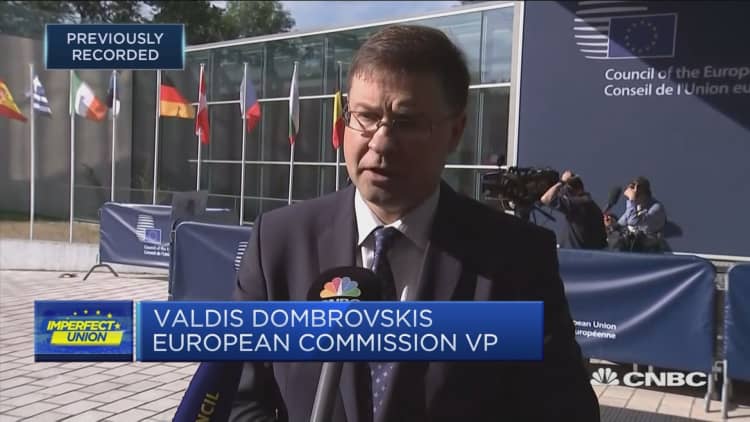Euro zone finance ministers have managed a few more steps in their quest for a common budget, but have yet to decide how to fund it and by how much.
In 2017, a wide-ranging and pro-EU speech from French President Emmanuel Macron argued that the euro zone needed its own budget. The idea was to have a pool of money worth several percentage points of euro zone's growth available to help countries to weather economic shocks.
Since then, the euro area has seen an intense battle of words between two main camps: One led by France supportive of a common budget with direct contributions from member states, and a second , led by the Netherlands who have strong doubts on giving money to other nations without really knowing for what purpose.
What has been the compromise?
The 19 finance ministers agreed, after a marathon meeting that ran into the early hours of Friday morning last week, that the euro zone should have its own budget to help with structural reforms and public investment.
European Commission Vice President Valdis Dombrovskis told CNBC in Luxembourg: "It has been a long night, and indeed we made progress on several important euro zone reforms."

One economist described the decision on the euro area budget as an "important step into the right direction." "The euro zone budget is historic as five years ago no one would ever have thought of such a thing. True, it's only symbolic, only a small foot in the door. However, it could become an important instrument in the future," Carsten Brzeski, chief economist at ING, told CNBC via email.
Why does this matter?
This is another step in wider efforts to bring the different euro zone economies together, making the entire region more resilient against financial shocks. This is often a criticism and is seen as a disadvantage for those countries that share the single currency who have the same monetary policy but different fiscal realities.
Ricardo Garcia, a euro zone economist at UBS, told CNBC: "The euro zone budget is being structured in quite a growth supportive manner as any grants are linked to reforms or infrastructure projects, which makes sense from a European perspective."
"The co-financing element further ensures alignment of interest and mitigates the risk of misallocation of funds," he added.
At some point in time, Germany and the Hanseatic league will have to make up their minds: Do they opt for looser fiscal policies ... or a bigger euro zone budget to keep the stability rules alive, or looser monetary policies.Carsten BrzeskiChief economist at ING
But what about the funding?
This is likely to be resolved only at a later date. There is disagreement over whether the funding should come entirely from the wider EU budget – the pool of money that all the 28 member states of the EU contribute to. This would prevent euro zone countries from having to put aside much more money than what they already do.
However, the EU has yet to negotiate its own budget for the next seven-year period. Other countries believe there should be additional contributions from the euro zone countries to boost the euro area's budget.
The EU budget is a combination of contributions from all 28 countries and is used to help with a range of activities across them, such as infrastructure projects, development of rural area, border protection and promotion of human rights. On the other hand, a euro area budget is only meant to be used by the 19 members that share the euro and only with the purpose of supporting structural reforms and public investment.
"The aim is to make the euro zone budget part of the EU budget. The EU budget in turn will depend on what happens with Brexit in October and more importantly, on the result of the German coalition review this year. Therefore again, this is the best we could hope for at this stage," Garcia said.
This suggests that it will take some time until the European Union approves its next spending plan. Only once that's achieved, will the euro zone will be able to finish the details for its own budget.
"At some point in time, Germany and the Hanseatic league (a smaller group within the euro zone who are stricter on fiscal prudence) will have to make up their minds: Do they opt for looser fiscal policies — either more flexible rules of the Stability Pact (which determines countries should not have a deficit higher than 3 of growth and public debt above 60% of growth) or a bigger euro zone budget to keep the stability rules alive – or looser monetary policies," Brzeski said.



